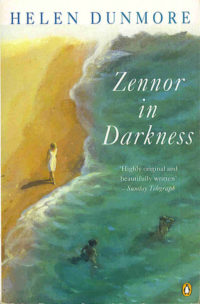A wild and unstoppable song of triumph
 Zennor in Darkness
Zennor in Darkness
by Helen Dunmore
I picked this off the TBR because while on holiday in Cornwall I’d spotted a signpost to Zennor and remembered I had this book. Plus I like Helen Dunmore’s writing. This was actually her debut novel, which also intrigued me.
Zennor is a small village near St Ives. It’s 1917 and the Great War is at its height. Clare Coyne has always felt like an outsider in her home town, having been raised by her outsider father after her mother’s death. She has cousins, aunts and uncles just a few streets away, and counts some of her best friends among them, but she is still very much separate from them.
“Better not think about it. It’s like a bruise, and the day is magnificent. You could sing aloud, glorying in it. You could understand that the Magnificat was once a wild and unstoppable song of triumph, not a delicate lacework of church voices. Little complicated fields glitter…On her right the sea shines like shield.”
The story opens on the eve of her beloved cousin John William’s home leave. The way Clare looks forward to this hints that she feels something for him more than familial bonds and friendship. She is enjoying an afternoon at the beach with John William’s sister, her cousin Hannah, and their dear friend Peggy. Dunmore slowly, lyrically introduces the three young women. We learn that Hannah is waiting impatiently to hear from her boyfriend Sam, who should also be on leave.
Into this story of waiting on people, waiting on news, intrudes a true outsider: DH Lawrence, who has brought his German wife Frieda out of London. His reasons are many: living costs, anonymity, escaping from a recent court case. But suspicion surrounds his wife, and therefore him by extension. The small town gossip is more than wary glances in this time of warnings about spies, but Lawrence has made friends at a local farm and interacts little with the world beyond that, which suits him just fine. But he worries about Frieda not having company, so when he meets Clare and finds her more interesting than the frivolous youth he had expected, he sees an opportunity.
“He stops writing and chews his pen. He knows that he will never say these words aloud; not as they stand. They are to be dropped, one by one, a word here and a murmur there. He blots the paper and folds it over, stamping the crease with his fist. These are notes to himself. They will keep his purpose firm.”
I had expected the relationship between Clare and Lawrence to become the central story in the book, but it’s actually a minor part. Then again, the writing is so low-key that none of the storylines feels as central as the inner monologues of Clare and Lawrence. It’s a very lyrical book, which makes it feel slow-going when actually, on examination, a fair amount happens in just over 300 pages. I felt this style perfectly captured the atmosphere of a small country town during wartime, the sense of unreality and time suspended. Even the pockets of grief and sorrow don’t quite feel real – it’s as if nothing will be until the war is over.
I really liked this book. And yet it took me forever to read it. Well, two weeks. I guess it isn’t especially gripping, and that sense of unreality is also distancing. But perhaps it’s just a book that demands to be read slowly, to be savoured. And that’s not a bad thing.
Published 1993 by Viking.
Source: Given to me by Tim’s mum.